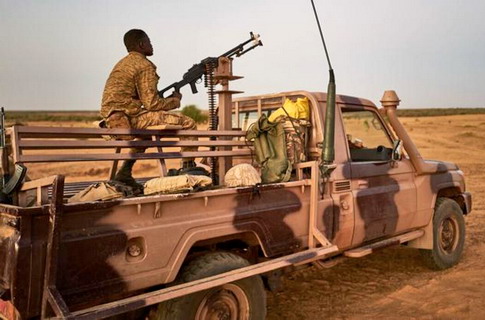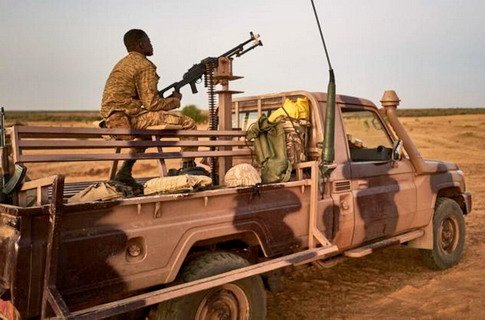
The United States is gravely concerned about the increase of terrorism in West Africa and the Sahel, as well as democratic backsliding, and urges the United Nations Office for West Africa and the Sahel (UNOWAS) to continue to promote inclusive democratic processes in the region, which will also strengthen counterterrorism efforts.
This is according to US Ambassador Robert Wood, Alternate Representative for Special Political Affairs, who on 19 June delivered remarks to a UN Security Council Arria-formula Meeting on Combatting the Rise of Terrorism and Violent Extremism in West Africa and the Sahel.
“The Sahel is the global epicentre of terrorism deaths, and this threat cannot be addressed without partnerships. These partnerships need to include civil society, in order to sustainably address the conditions conducive to terrorism and violent extremism,” Woods said.
Respect for human rights and the rule of law is a cross-cutting pillar of the UN Global Counter-Terrorism Strategy, he emphasised, and when counterterrorism efforts and laws are overly broad or vague, they can shrink civic space and can lead to radicalisation to violence.
The Economic Community of West African States (ECOWAS) and the African Union have promoted the full, equal, and meaningful participation of women in advancing peace and security in all areas and at all levels, Woods said. “Unfortunately, women and girls are also disproportionately affected by sexual and gender-based violence. We condemn its use by terrorists in the region, including Boko Haram. We welcome that Resolution 2734, adopted last week, recognizes these acts are eligible for designation under the criteria in the ISIL and Al-Qaida sanctions regime.”
Woods added that the United States remains deeply concerned by the Wagner Group’s human rights abuses and the threat its disinformation poses to civilians. Wagner’s operations exacerbate popular grievances, fuelling terrorist recruitment, he said.
“The United States has contributed funding to several UNOCT [United Nations Office of Counter-Terrorism] programmes including the CT Travel, Border Security, and Victims of Terrorism Programmes. We encourage other Member States to fund whole-of-UN efforts, as reflected in the Joint Appeal for Counterterrorism in Africa.
“
We are keen for the UN Resident Coordinator to arrive and begin her work in Burkina Faso, and we call on the Transition Authority to permit humanitarian organizations to operate and move freely. We also continue to emphasize the need for a UN Resident Coordinator in Niger to lead the UN’s work to support development and lifesaving humanitarian assistance. The United States is fully committed to working with members of the Security Council to reinvigorate collective efforts with our African partners,” Woods concluded.
Woods remarks come as the epicentre of terrorism has shifted out of the Middle East and into the Central Sahel, which now accounts for over half of all deaths from terrorism, according to a new report.
The latest Global Terrorism Index 2024 publication by the Institute for Economics and Peace (IEP) found that Burkina Faso is now ranked first on the Global Terrorism Index (GTI). In the 13 years that the GTI covers, it is the first time a country other than Afghanistan or Iraq has been top of the index: almost 2 000 people were killed in terrorist attacks in Burkina Faso in 258 incidents last year, accounting for nearly a quarter of all terrorist deaths globally.
“The impact of terrorism in Burkina Faso has increased every year since 2014, with terrorism also surging in its neighbours, Mali and Niger. In Burkina Faso in 2023, deaths from terrorism were up 68%, even though attacks decreased by 17%,” the IEP reported.
Regionally, the report found that the impact of terrorism is far higher in sub-Saharan Africa, the Middle East and North Africa, and South Asia than any other regions in the world. These three regions accounted for 94% of deaths from terrorism in 2023, with sub-Saharan Africa alone accounting for just under 59% of all fatalities.
“The epicentre of terrorism has now conclusively shifted out of the Middle East and into the Central Sahel region of sub-Saharan Africa. There were just under four thousand deaths from terrorism in the Sahel in 2023, or 47% of the total. The increase in terrorism in the Sahel over the past 15 years has been dramatic, with deaths rising 2 860%, and incidents rising 1 266% over this period,” the IEP found.
Burkina Faso, Mali and Niger account for most of the terrorism deaths in the region. All three face uncertain futures, having suffered from coups, weak governance, and fragile relations with neighbouring countries, exemplified by their recent withdrawal from ECOWAS (Economic Community of West African States).
There is some indication that terrorist activity in the Sahel is beginning to spread into neighbouring countries, as Benin and Togo each recorded more than 40 deaths from terrorism for the first time last year.
Particularly in the Sahel region, there is a strong correlation between organised crime and terrorism. “As terrorist groups like JNIM have expanded their territorial control in the region, there has been a surge in kidnappings, ransom demands, and attacks on gold mining operations. Terrorist groups integrate organised criminal operations by co-opting illicit economies, taxing both criminal and unregulated legal enterprises, and providing security for criminal groups and the transportation of illicit goods,” the IEP reported.









